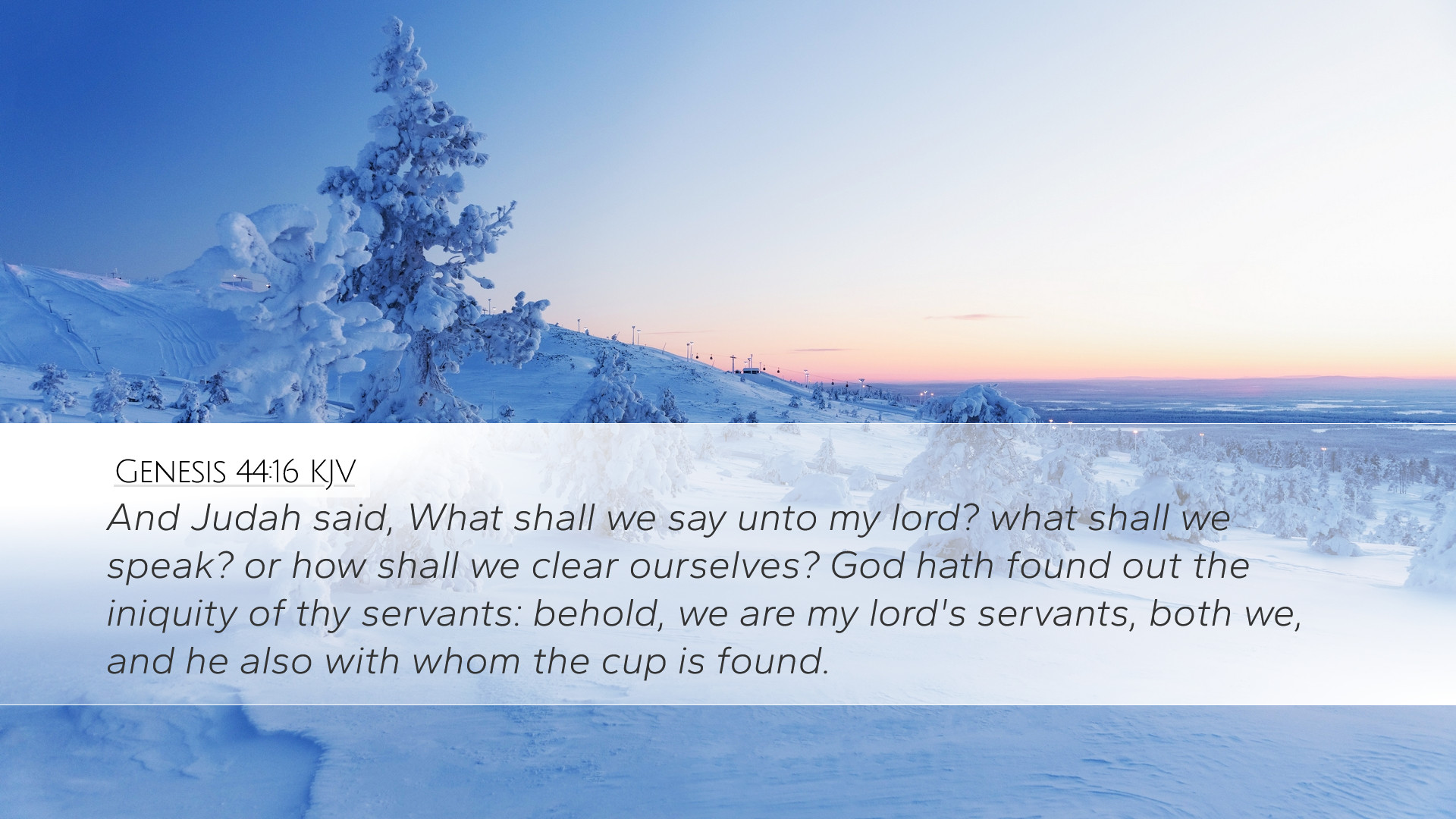Commentary on Genesis 44:16
Genesis 44:16 states, "And Judah said, What shall we say unto my lord? what shall we speak? or how shall we clear ourselves? God hath found out the iniquity of thy servants: behold, we are my lord's servants, both we, and he also with whom the cup is found."
This verse is pivotal in understanding the narrative of Joseph and his brothers, portraying a deep moment of recognition, humility, and responsibility in the face of looming consequences. Various commentators provide insights into the significance of Judah's declaration.
Understanding the Context
The events leading up to this moment involve a series of dramatic encounters between Joseph and his brothers. After the famine drove the brothers to Egypt for grain, they became entangled in a test orchestrated by Joseph to assess their character and repentance for their past actions against him.
Insights from Matthew Henry
Matthew Henry emphasizes the weight of Judah's words as he exposes the moral dilemma they faced. Judah’s rhetorical questions illustrate their realization of their precarious position before Joseph, whom they still do not recognize as their brother. Henry notes that Judah acknowledges divine providence, stating that God has uncovered their sins. This sense of divine accountability reflects an awareness of guilt that had long been buried.
Henry explains that Judah’s plea is steeped in humility and desperation. He signifies a shift from self-preservation to collective responsibility, as he includes all the brothers in this admission of guilt. This collective acknowledgment is critical in highlighting the moral and emotional development of the brothers throughout the narrative.
Reflections from Albert Barnes
Albert Barnes takes a more in-depth look at the theological implications of this moment. He points out that Judah’s admission, "God hath found out the iniquity of thy servants," serves as recognition not only of personal wrongdoing but also of the overarching sovereignty of God in their lives.
Barnes elaborates on how this admission is pivotal in the process of repentance. It signifies a turning point where the brothers could no longer evade their past; instead, they confront it head-on. The phrase "we are my lord's servants" is particularly critical as it denotes submission. Here, Judah seems to accept whatever the outcome may be, willing to sacrifice himself for the sake of his brother Benjamin.
Insights from Adam Clarke
Adam Clarke offers additional perspective on Judah's approach to Joseph. He interprets Judah's speech as an exemplary model of repentance and intercession. Clarke points out that Judah is not just seeking to defend himself but is also advocating for Benjamin, recognizing the familial bonds that transcend their previous actions.
Clarke notes that the tone of Judah’s speech is characterized by a profound sense of urgency and seriousness. He contrasts Judah's earlier character, highlighting how a transformation has occurred due to their experiences in Egypt. Clarke emphasizes the notion that through their trials, God uses challenges to mold their characters, steering them toward repentance.
The Theological Implications
This verse embodies a theme of divine justice and mercy. The brothers’ admission illuminates the theological principle that acknowledges God’s sovereignty in human affairs and His desire for repentance. Judah's plea serves not only as an expression of shame but also as a recognition of God's hand in their lives—a sentiment echoed throughout the biblical narrative.
Practical Applications
For pastors and theologians, Genesis 44:16 serves as a poignant reminder of the importance of sincerity in confession and accountability in community. Judah’s willingness to bear the consequences for Benjamin's sake illustrates the ideal of sacrificial love, reminiscent of the greater sacrifice portrayed in the New Testament.
For students and scholars, the complexity of human relationships, guilt, and redemption presented in this passage reveals rich theological insights into human nature and divine grace. The multiple layers of meaning in Judah's words provide a fertile ground for exploration of sin, repentance, and the transformative power of God’s love.
Conclusion
Genesis 44:16 stands as a critical moment in the narrative arc of Joseph and his brothers. Drawing from the wisdom of esteemed commentators such as Henry, Barnes, and Clarke, readers are afforded a comprehensive understanding of its theological and moral implications. This verse invites both reflection and action, challenging individuals to embrace accountability and seek redemption through a sincere relationship with God.


